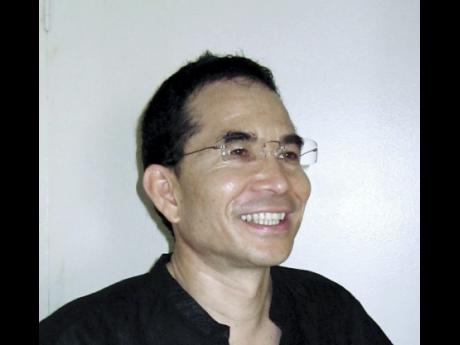Columns By Category
Popular Articles
- THE REALITY OF TACKY AND SAM SHARPE
- PLEASE DON’T BETRAY US AGAIN POLITICIANS
- CRY, MY MURDEROUS COUNTRY
- MODERNIZING THE PNP: VERSION.2020
- IS THE EXCHANGE RATE ON TARGET OR IS IT A WHOPPER?
- CARICOM: BEACON OF DEMOCRACY OR COWARDLY DISGRACE?
- DEMOCRACY PREVAILS IN THE UNITED STATES
- THE CRIME STATISTICS SPEAK FOR THEMSELVES
- PETROJAM, OIL PRICES, AND THE $7 TAX
- Kevin O'Brien Chang | Brains, not brutality – smart(phone) crime fighting
- TERRORISM IN JAMAICA
- STOP CURRENCY CRISIS TALK
- 'CASTIGATED KD' AND THE 9 YEAR WONDER
- GET PAST MERE TALK ON DONS AND GARRISONS
- LOW VOTER TURNOUT MYTHS AND ELECTION PREDICTIONS
- HOW GREAT CAN BROGAD BE?
- PNP WAS SOCIALIST FROM THE START
- AN AGE AND GENDER RE-ALIGNMENT ELECTION?
- Most influential Jamaican of 2010-2019?
- NO GAYLE, NO RUSSELL, NO TALLAWAHS
A THRILL OF HOPE
- 12-16-2015
- Categorized in: 2012 Articles

Christmas is at once the most hedonistic, commercialised, and holiest time of the year. Technically, the most important Christian day is Easter Sunday, the day of resurrection. Yet, even devout churchgoers generally pay more attention to Christmas than Easter. And even humbug scrooges find it hard to resist spirit-brightening festivities and gift-exchanging pleasures.
It's also, of course, the season of conception, as baby births peak nine months after Christmas. That this mix of deity, merrymaking, fertility and mammon is the focal point of our calendar says much about man's paradoxical nature.
Nothing so evokes the contradictory emotions of Christmas as carols - probably the world's most universally popular songs. Tunes like O Holy Night, Jingle Bells, All I Want for Christmas is You, and Santa Claus is Coming to Town may not have much in common lyrically. But all celebrate a special season of heightened emotions and shared humanity. And who doesn't enjoy singing along to such songs, especially when children are around? It's one of life's few guaranteed sources of sheer delight and uncomplicated joy.
Santa Claus' original inspiration was Saint Nicholas the Wonder worker, the legendarily generous fourth-century Bishop of Myra. To cynics, Santa is now merely a capitalistic marketing tool designed to brainwash children into materialism.
Unprofitable
Yet, however bowdlerised into a fat red elf by the vagaries of history, beloved St Nick never-theless does things saints do. He hears our requests, gives gifts to the needy, and encourages moral living, goodwill and generosity.
But Christmas is the time when the 40 per cent of mankind who count themselves Christians acknowledge their Saviour. Without Christ, say the carols, the uses of this God-forsaken earth truly are weary, stale, flat, and unprofitable. But His coming has brought comfort and joy to the world.
Some reject Christ and yet celebrate the idea of Christmas as the season of peace and love. But as Miguel de Unamuno said, to claim religion's virtues and consolations and yet refuse religion itself amounts to moral and emotional parasitism. If 'survival of the fittest' Darwinian evolution is life's only driving force, what sense does it make to talk about universal peace? If love has no higher source, how can it be anything but a figment of the human imagination? Take away the 'do unto others' message of Christ, and Christmas is merely a spiritually devoid parade of parties and presents.
Though unquestioning faith may grant an unmatched peace of mind, belief is not something to be willed. Many must echo these lines from Sir John Betjeman's Christmas.
"And is it true,
This most tremendous tale of all,
Seen in a stained-glass window's hue,
A Baby in an ox's stall?
The Maker of the stars and sea
Become a Child on earth for me?"
Perhaps it is not true. It may be that neither Christ nor God nor any higher power nor the soul nor Nirvana nor any non-material reality exists. Perhaps the universe is but an indifferent cosmic accident, life merely a chemical reaction, and consciousness of self only an illusionary by-product of the brain's neural interactions. Is life just "a tale told by an idiot, full of sound and fury, signifying nothing"? None of us can say.
Two facts apply to every human being - we all want to be happy, and we're all going to die.
Amid all festivities, this is the reality to which the hymns of Christmas speak. As the lyrics of the lovely O Holy Night say:
"Long lay the world in sin and error pining,
Till He appeared and the soul felt its worth.
A thrill of hope, the weary world rejoices
For yonder breaks a new and glorious morn...
Truly He taught us to love one another;
His law is love and His gospel is peace.
Chains shall He break for the slave is our brother
And in His name all oppression shall cease."
The real magic of Christmas lies in this thrill of hope. The hope that universal brotherhood is not a vain dream, that true happiness is not impossible, that life on this vale of tears is not without meaning, that love is not just an illusion.
